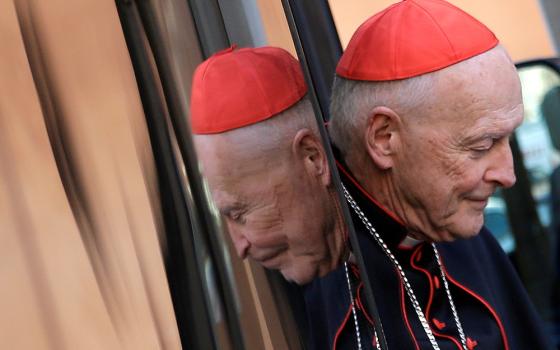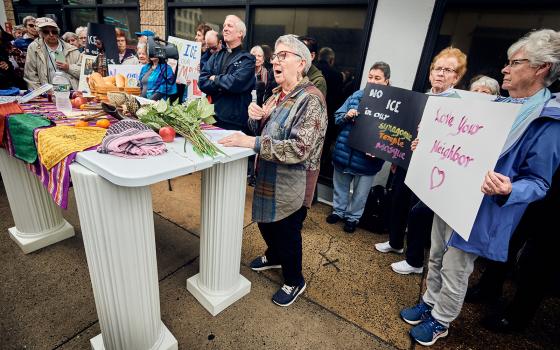The sudden death of "pro-life, eco-feminist" activist Mary Krane Derr just weeks prior to the 40th anniversary of the Roe v. Wade Supreme Court decision took her friends by surprise. Derr, 49, who suffered from chronic health problems, became ill in India, where she was doing a poetry reading, and died Nov. 30 after returning to her Chicago home. She is survived by her husband, Jonathan Derr, her daughter, Sarah, and a grandson.
Derr, also an animal rights activist and poet, was among the leadership of numerous groups that support a consistent ethic of life, including Consistent Life and Feminists for Life.
"Perhaps no one was more responsible than Mary for revealing our rich pro-life feminist history," Feminists for Life said in a tribute, which continued:
"In 1998, Mary attended FFL's Pregnancy Resource Forum at her alma mater, the University of Chicago. She recalled her own pregnancy while she was a student and the pressure to abort -- Mary faced significant health issues. By then Mary was a trained counselor herself. She told the forum panelists that the best thing other counselors can do when telling a woman that she is pregnant is to let her take some time to absorb the news adding -- 'Once you are pregnant you are changed no matter what you choose. Counselors should ask the woman: What would be the best outcome for you and your child? -- Then help her achieve that dream.' Her then ten-year-old daughter, Sarah, was at her side. ... We will honor Mary by continuing to share the pro-life feminist history that she so carefully researched for us to enjoy today."
Derr's colleague and friend Rachel MacNair, vice president of Consistent Life and former president of Feminists for Life, said rather than trying to persuade people "who were open-minded and willing to listen" on the topic of abortion, Derr specialized in taking on "dyed-in-the-wool pro-choice activists" in civil conversation. In 2009, at The Progressive's 100th anniversary conference, MacNair said Derr would always bring up abortion and "consistency points."
"I just tabled, but she went to sessions and brought things up," MacNair said. "She was an expert on dialogue with pro-choice activists."
In a 2009 interview with NCR, Derr described herself as an "eco-advocate, vegetarian, inner-city organic community gardener and caretaker of adopted guinea pigs." Derr said eco-feminism "recognizes that the oppression of women and the destruction of the natural world are interconnected forms of domination and destruction."
Abortion and the politics of abortion were important components of Derr's work.
"Since the time of the early women's rights advocates, who were often vegetarians and conservationists, eco-feminism has made visible the many interconnections between the oppression of women and the destruction of other-than-human creatures and whole ecosystems," Derr told NCR. "Like animals, like anyone or anything looked upon as 'nature,' women are treated as less-than-sentient, as not having innate value or rights of any kind. So are children, whether born or unborn. Sometimes it has been said that they 'have no souls.'
"So our culture massively fails all these sentient, inherently valuable, rights-bearing beings. One tragic and wholly unnecessary result is that millions of pregnant women are backed into corners where abortion appears the only or the least bad choice. Yet both sides of the abortion debate speak in individualistic terms only. This obscures the underlying causes of abortion and hinders the quest for solutions."
While many progressives view an anti-abortion position as untenable, Derr did not hold those with pro-choice views to that standard.
When asked if someone could be pro-choice and an eco-feminist, she replied, "I am loathe to turn around and disqualify someone else as an eco-feminist because they have a different position from mine on abortion.
"Now, I myself believe that eco-feminism is the most complete, the best it can be, if it includes a genuinely pro-life approach to abortion. Otherwise I wouldn't risk the drubbing that sometimes follows when one expresses such a thing.
"At the same time, I realize that eco-feminists who identify as pro-choice are not the selfish, evil people that some anti-abortionists take them for. They too are struggling to find a way to make peace among men, women, and the Earth, and they too are concerned about the suffering of women and children. ... If ecological consciousness is about anything, it's about empathy. And that means empathy for people on the other side of the abortion divide."
[Patrick O’Neill is a freelance writer living in Raleigh, N.C.]




